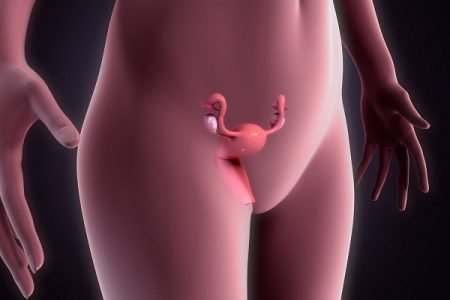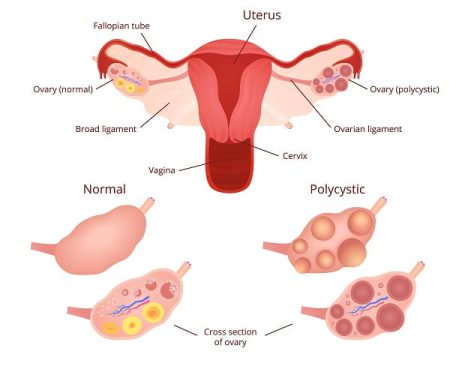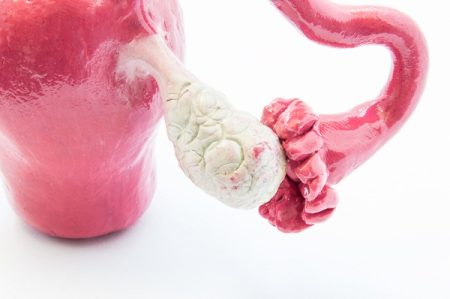What Are the Signs and Symptoms of Endometriosis?
- Updated on: Jun 11, 2024
- 3 min Read
- Published on Sep 27, 2019


Endometriosis symptoms
Endometriosis affects about 5 million women in North America only. The common symptoms of endometriosis disease are:
Painful periods (Dysmenorrhea)
Painful menstruation is the most common symptom of endometriosis. The pain starts a week before ovulation and continues even after a week of periods. Pain along with discomfort and severe cramping is common in endometriosis. The cramping radiates and comes in waves.
Over-the-counter medications are most opted treatment options for painful periods. They give mild muscle relaxation to stop cramping. Most women describe periods as painful experience, however, women suffering from endometriosis describe it worse than usual.
Some women also report pain elevation with time.
Excessive bleeding during menses
Excessive bleeding is another threatening symptom of endometriosis. Periods that last for more than 7 days can cause the low level of iron in the blood and body. This leads to anemia and fatigue.
Hair loss is another problem associated with excessive loss of blood during menses. Women having more than usual bleeding in menses are prescribed with iron supplements and intravenous injections to maintain the level of iron in the blood.
Doctors suggest that birth control pills help in endometriosis as these pills can reduce the number of periods per year which reduces the symptom entirely.
Infertility
Infertility can be another disturbing symptom associated with this condition.
About 30% of women suffering from endometriosis are not able to conceive. Scarring of tissue and damaged ovaries and uterus muscles are the reasons for not being able to conceive. In some cases, getting pregnant is not the main issue but carrying a child to term is.
Women suffering from this condition have higher chances of miscarriage due to hormonal imbalances.
Painful intercourse
Endometriosis is a severe condition that causes damage to reproductive organs. The condition also causes painful intercourse to women affected by it.
Penetration and intercourse can push against the already injured tissue leading to damaged muscles. Partners should go slow and have an open conversation at this time. The problem should be consulted with healthcare professionals.
Severe back pain
A number of conditions can causes back pain in endometriosis.
Severe lower back pain is common before, during and after periods in women suffering from it. The pain is mainly caused due to contractions in the uterus and cramping.
Endometriosis also causes scarring of internal tissue leading to back pain. The pain exudes from back to the chest. Doctors prescribe a warm bath to help relax back muscles along with medications for reliving the pain.
Pain in pelvis and lungs
Pelvic pain is also a symptom of endometriosis. The foreign tissue binds outer walls of internal organs together causing pulling and tearing with certain movements. Severe pelvic pain during certain activities like exercise, running, walking etc. is reported.
In severe cases, standing for a long time can also cause unbearable pain to the person. In some rare cases, endometrial implants can attach to the lungs causing blood in a cough and difficulty in breathing.
Painful bowel movement
Women suffering from endometriosis also suffer from gastrointestinal issues. The situation is as simple as a painful bowel movement. The condition is commonly caused by endometrial tissue rubbing against intestines from the back of uterus.
The tissue can attach to bowel and cause scarring of intestinal walls. Other gastrointestinal problems associated with endometriosis are:
- Pain during bowel movement
- Blood in stool
- bloating
- Cramping
A doctor should be immediately consulted if the person notices any blood during or after the bowel movement.
Other bowel issues
Women suffering from endometriosis have higher chances of developing irritable bowel movement or IBS.
Endometrial implants cause inflammation that affects large intestine and bowel related problems. If a woman suffers from persistent constipation or diarrhea, she should consult the doctor to analyze the symptom. Sometimes, a specific food or a change in lifestyle can also cause bowel issues. However, symptoms of IBS and endometriosis overlap with one another.
Painful urination
Pain during urination is another symptom of endometriosis. Urinary tract along with reproductive system is affected with this condition. This includes urethra, bladder and kidneys.
Endometrial tissue implants may form in these areas along with uterus walls. Blood in urine is a warning sign and it should not be taken casually. Other problems associated with it are:
- Pain in kidneys
- Frequent urge to urinate
- Inability to urinate
Fatigue
Fatigue may be another symptom of endometriosis that is commonly ignored by women. The implanted tissues on the outer walls of internal organs and injury to the muscles can cause fatigue as the body struggles to perform normal functioning. It can also cause hormonal imbalance in women. If a person suffers chronic fatigue, the problem should be discussed with the doctor.
The extent of pain during periods is usually not a reliable indicator in this disease. Women with endometriosis may suffer from mild to excruciating pain during periods.
The disease is often mistaken for ovarian cysts and pelvic inflammatory disease (PID) due to overlapping symptoms. Timely diagnosis by healthcare professionals is important to avoid other serious problems and provide proper treatment on time.












